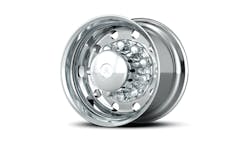Study: Forged Aluminum Wheels Cut CO2 for Commercial Vehicles
Alcoa Wheel & Transportation Products has released a lifecycle assessment (LCA) that concludes forged aluminum wheels have a significantly lower “carbon footprint” than comparable steel wheels for commercial vehicles. The study found that North American trucks with 18 forged aluminum wheels could reduce their carbon emissions by 16.3 metric tons over the life of the wheels; European trucks with 12 forged aluminum wheels can reduce carbon emissions by 13.3 metric tons.
The results of “Comparative Life Cycle Assessment of Aluminum and Steel Truck Wheels” were presented this week the 12th Annual American Center for Life Cycle Assessment Conference, and are available online.
“Lifecycle assessment is the universally accepted method to comprehensively assess the environmental impact of a product,” according to Dr. Christoph Koffler, technical director of PE International Inc. & Five Winds Strategic Consulting, which conducted the study. “Our findings are based on the full lifecycle of Alcoa forged aluminum wheels—from the raw materials, through the production, distribution, use, disposal, and recycling of the product.”
Alcoa called the study “the most comprehensive and transparent comparative LCA ever conducted on aluminum and steel truck wheels.”
The “cradle-to-grave” inquiry analyzed the entire production process of commercial vehicle wheels — from raw material mining to wheel manufacturing, service life, and post-service life including recycling and landfilling. It used the latest available data on energy and material consumption, greenhouse gas emissions, and other environmental releases.
For example, aluminum wheels require more energy to manufacture than steel wheels, but the weight and recyclability of aluminum result in a net energy savings throughout the wheel’s “life.”
Break even
The LCA concluded that a truck with aluminum wheels may “break even” on CO2 impact in as little as two years, or at about 205,000 miles. At that point, all the travel on aluminum wheels produces CO2 and energy savings.
Among other highlighted results, the LCA found that the 16.3 metric ton saved by switching one 18-wheel truck from steel wheels to Alcoa forged aluminum wheels is equal to the average annual carbon footprint of a four-person American household.
Also, it concluded that Alcoa wheels maintain their value throughout their lifetime, and have an end-of-life scrap value nearly equal to the value of primary aluminum.
Alcoa provided primary data for aluminum wheel production from five of its plants, including the Cleveland and Barberton, OH, operations, as well as plants in Mexico, Hungary, and Japan. PE International provided data on fuels, raw materials, and steel wheel manufacturing, including primary metals and chemicals.
The study conformed to ISO methodology and was peer-reviewed by LCA professionals, including experts from the Technische Universitat Berlin and the University of Michigan.
“As commercial vehicles face stricter regulations around reducing carbon emissions, this lifecycle assessment confirms that Alcoa forged aluminum wheels support sustainable transportation and can help trucks and trailers to be greener,” stated Tim Myers, president, Alcoa Wheel and Transportation Products. “Compared to steel, the lighter weight and infinite recyclability of Alcoa forged aluminum wheels support greener vehicles that cut down on fuel use and carbon emissions.”
About the Author
Robert Brooks
Editor/Content Director - Endeavor Business Media
Robert Brooks has been a business-to-business reporter, writer, editor, and columnist for more than 20 years, specializing in the primary metal and basic manufacturing industries. His work has covered a wide range of topics including process technology, resource development, material selection, product design, workforce development, and industrial market strategies, among others.
Currently, he specializes in subjects related to metal component and product design, development, and manufacturing—including castings, forgings, machined parts, and fabrications.
Brooks is a graduate of Kenyon College (B.A. English, Political Science) and Emory University (M.A. English.)

